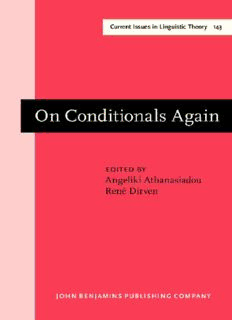Table Of ContentON CONDITIONALS AGAIN
AMSTERDAM STUDIES IN THE THEORY AND
HISTORY OF LINGUISTIC SCIENCE
General Editor
E.F. KONRAD KOERNER
(University of Ottawa)
Series IV - CURRENT ISSUES IN LINGUISTIC THEORY
Advisory Editorial Board
Henning Andersen (Los Angeles); Raimo Anttila (Los Angeles)
Thomas V. Gamkrelidze (Tbilisi); John E. Joseph (Hong Kong)
Hans-Heinrich Lieb (Berlin); Ernst Pulgram (Ann Arbor, Mich.)
E. Wyn Roberts (Vancouver, B.C.); Danny Steinberg (Tokyo)
Volume 143
Angeliki Athanasiadou and René Dirven (eds)
On Conditionals Again
ON
CONDITIONALS
AGAIN
Edited by
ANGELIKI ATHANASIADOU
Aristotle University, Thessaloniki
RENÉ DIRVEN
Gerhard-Mercator University, Duisburg
JOHN BENJAMINS PUBLISHING COMPANY
AMSTERDAM/PHILADELPHIA
The paper used in this publication meets the minimum requirements of
American National Standard for Information Sciences — Permanence of
Paper for Printed Library Materials, ANSI Z39.48-1984.
Library of Congress Cataloging-in-Publication Data
On conditionals again / edited by Angeliki Athanasiadou, René Dirven.
p. cm. -- (Amsterdam studies in the theory and history of linguistic science. Series
IV, Current issues in linguistic theory, ISSN 0304-0763 ; v. 143)
Includes index.
1. Grammar, Comparative and general-Conditionals. I. Athanasiadou, Angeliki. II.
Dirven, René. III. Series.
P292.5.053 1997
415--dc21 96-50283
ISBN 90 272 3647 X (Eur.) / 1-55619-598-2 (US) (alk. paper) CIP
© Copyright 1997 - John Benjamins B.V.
No part of this book may be reproduced in any form, by print, photoprint, microfilm, or any
other means, without written permission from the publisher.
John Benjamins Publishing Co. · P.O.Box 75577 · 1070 AN Amsterdam · The Netherlands
John Benjamins North America · P.O.Box 27519 · Philadelphia PA 19118-0519 · USA
Contents
List of contributors
Introduction
Angeliki A thanasiadou 1
Part I: The core of conditionals
Conditionals and counterfactuals:
conceptual primitives and linguistic universals
Anna Wierzbicka 15
Conditionality, hypotheticality, counterfactuality
Angeliki Athanasiadou & René Dirven 61
The relation between past time reference and
counterfactuality: a new look
Östen Dahl 97
Mood, tense and the interpretation of conditionals
John Tynan & Eva Delgado Lavin 115
Part II: Single conditional constructions
Unless and but conditionals: a historical perspective
Elizabeth Closs Traugott 145
Conditional perfection
Johan van der A uwera 169
Generics and habituals
Ronald W. Langacker 191
Conditionals and restrictives on generics
Yael Ziv 223
Part III: Basic dimensions of conditionality
Conditionality as cognitive distance
Paul Werth 243
Conceptualization: conditionals as an
instance of figure/ground alignment
Elzbieta Tabakowska 273
Conditionals and polarity
John Taylor 289
Conditionality in dimensional perspective
Hansjakob Seiler 307
Part IV: Conditionals in use
Negative conditionality, subjectification,
and conditional reasoning
Noriko Akatsuka 323
The emergence of conditionals in child language:
are they really so late?
Demetra Katis 355
Speaking conditionally:
some contexts for if-clauses in conversation
Cecilia E.Ford 387
Subject Index 415
CONTRIBUTORS
Akatsuka, Noriko Department of East Asian Languages and Cul
tures, University of California at Los Angeles.
Athanasiadou, Angeliki Department of Theoretical and Applied Linguis
tics, School of English, Aristotle University of
Thessaloniki.
Auwera, Johan van der Department of Linguistics (GER), University of
Antwerp (UIA).
Dahl, Östen Department of Linguistics, University of Stock
holm.
Delgado Lavin, Eva Facultad de Filologia, Universidad del Pais
Vasco.
Dirven, René Anglistik, Gerhard-Mercator University of Duis
burg.
Ford, Cecilia Department of English, University of Wisconsin.
Katis, Demetra Department of Education, Aristotle University of
Thessaloniki.
Langacker, Ronald Department of Linguistics, University of Califor
nia at San Diego.
Seiler, Hansjakob Im Boll 21, -5600 Lenzburg.
Tabakowska, Elzbieta Institute of English Studies, Jagiellonian Univer
sity, Krakow.
Taylor, John Linguistics Section, School of Languages, Uni
versity of Otago.
Traugott, Elizabeth Department of Linguistics, Stanford University.
Tynan, John Facultad de Filologia, Universidad del Pais
Vasco.
Werth, Paul Department of Linguistics, University of Amster
dam.
Wierzbicka, Anna Department of Linguistics, Australian National
University.
Ziv, Yael Department of English, The Hebrew University.
Introduction*
Angeliki Athanasiadou
Conditionality has long been a central concern of various disciplines: lin
guistics, psychology, philosophy. It has been approached from remarkably
different angles thus exhibiting its multifaceted function and its crucial
role in our understanding of language.
The domain of conditionality was revisited in a symposium held at the
University of Duisburg in March 1994, ten years after the Stanford sym
posium from which the volume On Conditionals arose in 1986, edited by
E. Closs Traugott, A. ter Meulen, J. Snitzer Reilly and C.A. Ferguson. De
spite a ten year time span, the present volume, which is a product of the
Duisburg symposium, offers a tribute to the first volume and is therefore
entitled On Conditionals Again, in order to establish continuity with the
1986 collection of papers. The purpose of the Duisburg symposium on
conditionality was to take stock of the various current trends in the rese
arch on conditionality. But its more specific and ultimate puipose is to
place conditionality within the wider framework of general processes of
conceptualisation, i.e. which conceptual categories fall under conditionali
ty and which do not, or how far the notion of conditionality can be exten
ded.
The contributions in the present volume do not attempt final solutions to
all fundamental questions (e.g. what is the nature of conditionality), but
they rather approach the old questions from a new perspective, accomodate
a wider range of data, and suggest many more challenging hypotheses
about the conceptual domain of conditionality. Though each contribution
is the result of an individual effort, the total collection portrays key issues
within the domain of conditionality as a whole.
The volume is divided into four parts: Part I presents core phenomena
such as hypotheticality, counterfactuality, and the use of mood and tenses.
Part II concentrates on single or specific conditional constructions such as
unless and but conditionals, only if, and genericness or restrictive generics.
Part III addresses basic dimensions of conditionality, such as cognitive di
stance, figure/ ground organisation, polarity, and dimensional perspective.
Description:The volume brings together a selection of papers from a symposium on Conditionality held in the University of Duisburg on 25-26 March 1994.Ten years after the Stanford symposium, the Proceedings of which were edited by Traugott et al. (1986), the area of conditionality is revisited in a synthesis of

